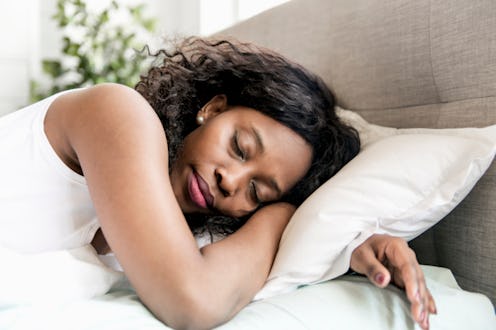Life
Astrologers Explain How The Full Moon Can Affect Your Sleep Cycle

The concept of things being a bit different around a full moon is quite well-known, in astrology and elsewhere. But the affects of a full moon may go way beyond just feeling out of whack. There may even be a correlation between a full moon and sleep. Astrologers know this all too well.
Scientifically, it's unclear exactly how the full moon affects sleep. Research by scientists at Basel University in Switzerland has found that, around a full moon, people may take longer to fall asleep, sleep less, and sleep less deeply. While other research has had similar results, final conclusions among the scientific community haven't yet been made.
In the world of astrology, however, the fact that a full moon may affect your sleep is no surprise. "The moon controls the ocean (the gravitational pull from the moon on Earth controls the tides of the ocean), and humans are made up of 50 to 70 percent water (depending on age and other factors)," astrologer Lisa Stardust tells Bustle. "Being that the moon controls the oceans and waters on Earth, [...] the human body [may be] affected as well by the lunar phases." As the moon affects the waters on earth, astrology believes it also affects the waters within us.
These changes can make us feel heightened emotions when the moon is full. We can feel lower lows and higher highs just like how high tides are higher, and low tides are lower, during a spring tide on a full moon. "The closer we get to a full moon, the more powerful the effect on heightening our emotions, for better or worse," spiritual wellness expert Jaya Jaya Myra tells Bustle.
Here are seven effects the full moon can have on sleep, according to astrologers.
1. The Full Moon May Disrupt Your REM Phase
If you feel a bit more sleepy, rather than re-energized, then the full moon may still be the culprit, astrology says.
"The full moon disrupts the deepest phase of sleep, the REM phase, as the cosmic night light can cause poor sleep quality," Stardust says. Coupled with the potential for increased energy and restlessness, it may make sleeping during a full moon extra difficult.
2. It Can Be Harder To Sleep
As science tries to understand why and how the moon messes with your sleep, astrology sees the correlation as quite intuitive.
"[It can be harder to sleep] due to the direct impact the moon has on the water element in our bodies," Jaya Jaya says. "The average human body is [mostly] water, making the moon quite capable of altering our mood and mental state. If the mind is turbulent, it is difficult to sleep. Imaging what a full moon or a new moon can do to our thought processes." A turbulent mind can mean a way harder time falling and staying asleep.
3. You May Dream More Actively
Dream symbols can be quite insightful, and a lot of these active dreams happen around a full moon, according to astrology.
"During a full moon, if someone is normally a creative person, the energy that radiates from the glow of the moon may stimulate more vivid dreams," Davida Rappaport, psychic, spiritual counselor, and tarot instructor, tells Bustle. While what they mean may not be immediately apparent, they are likely your mind's way of exploring your inner feelings.
4. You May Feel Restless
Feeling restless when you're trying to sleep can be incredibly bothersome. But hopefully these nights are confined to the full moon.
"When the moon is full, it can create a sense of restlessness," Rappaport says. "Adrenalin may be higher than normal, and it may be difficult to fall asleep due to an excess of energy." Working on some sleep techniques might help this monthly annoyance be less of a worry.
5. You May Feel Like You Need Less Sleep
It's possible that during a full moon your body will feel like it needs less sleep. According to astrology, this is due to the energy coming from the light of the moon.
"Today, there's no apparent difference between night and day," astrologer Aliza Kelly Faragher tells Bustle. "[...] But before electricity was invented [...] humans were greatly influenced by the moon's radiance [... so] during the full moon, when the moon glows at maximum illumination, we could engage in night time activities. This lunation jolted us with energy, and likewise, people still feel the moon's electric energy during this phase." Therefore, if you feel more energetic, it's your ancestors zest for the light of the full moon that you may be feeling. So if you plan your calendar of nighttime activities around the full moon, you may find you have the largest energy store around then.
6. You May Have More Trouble Getting Out Of Bed In The Morning
The full moon heightens emotions in astrology. So if you've already been feeling down, the full moon may make you feel temporarily worse.
"The moon also affects our bodies in other ways too," Stardust says. "New and full moons can make us feel depressed." If you notice serious symptoms, however, it's important to seek professional help.
The Takeaway
The moon's affect on you, astrologically, can be both emotional and physical. Both of these aspects can affect your sleep. "The moon is deeply engrained with our subconscious emotions, therefore, it’s no wonder moon phases affect our sleep patterns," Stardust says. While science may still be trying to figure out how or whether the moon affects our sleep, biologically speaking, astrology has found a deep correlation.
This article was originally published on